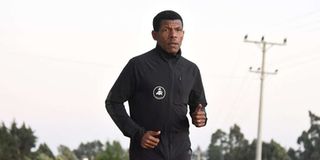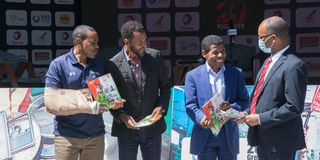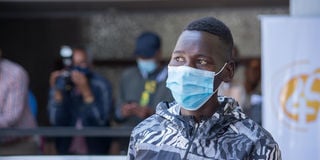
Ethiopia's running legend Haile Gebrselassie (left) explains features of the Hyundai electric car to Ethiopian Prime Minister Abiy Ahmed after he presented the car to the leader in Addis Ababa on July 27, 2020.
| Pool | Ethiopian EmbassyAthletics
Premium
Haile Gebrselassie: The secret behind my business success
What you need to know:
- Well, from 1,000 employees in 2015, and at 47 years of age today, Gebrselassie’s businesses have increased tremendously and he now has over 3,000 employees across his investments in Ethiopia and beyond.
- From a monthly income of just Sh2,000 as a professional Ethiopian Police runner in 1990, legend now banks over Sh83 million each month from his businesses
- Gebrselassie owns Marathon Motors, a vehicle business that also assembles Hyundai cars, and which recently rolled off the first electric car from its assembly plant
On May 10, 2015, a statement from the Global Sports Communication (GSC) head office on Snelliusstraat 10, Nijmegen in the Netherlands announced the inevitable retirement of their marquee athlete.
“Running legend Haile Gebrselassie announced his retirement from competitive running at the Great Manchester Run today where he ran his last competitive race,” GSC said in the statement.
“Haile Gebrselassie chose the Great Manchester Run for his last race as he always enjoyed this event which he has won five times,” the statement added.
“Haile Gebrselassie will now focus more on his businesses in Ethiopia. He employs more than 1,000 people in several businesses, and is involved in real estate projects, owns four hotels, a coffee plantation and is the distributor for Hyundai in Ethiopia.”
Well, from 1,000 employees in 2015, and at 47 years of age today, Gebrselassie’s businesses have increased tremendously and he now has over 3,000 employees across his investments in Ethiopia and beyond.
His long-time manager and GSC founder Jos Hermens describes Gebrselassie as “one of the best things that happened to me.”
“For many people, Haile is an inspiration because of his unbelievable performances on the track,” Hermens says in Emperor of Long distance,” a book compiled by photojournalist Jiro Muchizuki. “But it is his personality that makes him an icon.”

Ethiopian athletics legend Haile Gebrselassie during a morning run on the Iten-Kaptagat road in Elgeyo-Marakwet County on February 8, 2020.
I caught up with Gebrselassie Saturday evening off his busy schedule preparing for Sunday’s Great Ethiopian Run, and he explained some of the secrets behind his financial success.
Starting off from real estate about 25 years ago, and earning 10,000 birr (about Sh27,800 in current exchange rates) in monthly rent, Gebrselassie revealed to me that his current daily income from his various businesses is about 30 million birr (Sh83 million)!
No. It’s not an error. That’s actually what the greatest distance runner of all time rakes in each day from his businesses.
Gebrselassie moved to Addis Ababa as a 15-year-old and lived with his brother Tekeye who was a marathon runner, borrowed his shoes and entered a marathon – the Abebe Bikila Marathon – finishing 99th in two hours and 48 minutes.
That’s when he took running seriously, joining the Ethiopian Police Athletics Team where, from 1990, he would earn a salary of just $20 (about Sh2,000 in today’s rates).
Now, a holder of 27 world records in distance running, Gebrselassie is one of Ethiopia’s most successful business people.
Just how did he rise to such success, given that he was born on April 18, 1973, in a small village in Asela, some 200 kilometres outside Addis Ababa to farming parents who just had enough to keep them going?
“My business and what’s happening now is the result of 25 years,” he told me at the Hyatt Regency Hotel in Addis Ababa Saturday night after I managed to get a quick slot in his busy schedule, just before the “pasta party” celebrating Sunday’s 20th Great Ethiopian Run kicked off.
“When I started to get money, I started to invest. The investment was such that I only put my money in a project only if I’m sure I’m going to get it back with extra, with a profit of at least 10 to 20 percent, otherwise I don’t invest,” he disclosed.
“I started with a small house and the rent wasn’t that much… I remember at that time it was about 10,000 Birr (about Sh28,000) monthly. But now, out of my real estate business, this 10,000 Birr has grown to maybe 10 million Birr (about Sh28 million) a month now.”

Haile Gebrselassie’s eight-floor office block in Addis Ababa, where he runs his Hyundai franchise.
And this income doesn’t include his hotels, car businesses and other investments, which led me to asking the legend just how much income he gets each month.
“In total, from all businesses, not less than 30 million Birr a month (about Sh83.5 million). It’s very clear and I never hide anything… This is only hotel and real estate and doesn’t include the car business.
“In the car business, sometimes you can make 30 million Birr a day when business is good. But at the same time, you pay another 28 or 29 million as investment into the business.”
Gebrselassie owns Marathon Motors, a vehicle business that also assembles Hyundai cars, and which recently rolled off the first electric car from its assembly plant.

Ethiopian Prime Minister Abiy Ahmed (right) tries out a Hyundai electric car after it was presented to him by Ethiopia’s athletics legend Haile Gebrselassie in Addis Ababa on July 27, 2020. Gebrselassie owns Marathon Motors who assembled the car.
The company assembles 36 cars per day, with the possibility of increased numbers with a 24-year shift.
“But at the moment we don’t produce that much because there’s the dollar problem. But the demand is unbelievable! You can sell 500 to 600 cars a month easily.
“The potential is there because the company is only 10 years old. We used to import and sell, but now we assemble. The line is open for everything and you never know, perhaps in future we shall build our own engines,” he explains.
He says the biggest challenge facing Kenyan and Ethiopian athletes is because most of them come from poor backgrounds.
“We became athletes from nowhere. From the countryside. Our families had poor backgrounds, and as soon as we get the money, everybody wants a share of it. The main problem is when we start giving money, we lose the money faster than our running.
“My philosophy about money, which most of the Ethiopians don’t like, is I believe why should I give my money? It’s mine! Why don’t you sweat and make your money? Are you a beggar? You have hands and legs like what I have!
“If you want to borrow money from me, you return it. I don’t ask for interest or profit. But the problem in Ethiopia and Kenya, which is the same, is we feel disappointed if we don’t give our relatives money.”
Gebrselassie argues that another big problem with Kenyan and Ethiopian athletes is when they get money and fame, they forget about investment and when tragedy strikes and their career is over, they can’t cope with the depression that follows.
“As soon as you lose everything, you start to get depressed and you start drinking and many other bad things to hide from reality.
“When you are a superstar, everyone wants your attention, and you media also put headlines which makes us boast. But if you don't know how to handle this success, that’s the day you will fall.
“Athletes need to think about the future when they are in top shape, not when they stop running, because when they stop running, the money is also gone!”

From left: Ethiopian athletics legends Million Wolde, Gebregziabher Gebremariam, Haile Gebrselassie and Ethiopia's Minister of Culture and Tourism Habtamu Sissy Awas and Nation Media Group Editor (Sports) Elias Makori with copies of the "Athletics Kenya at 70” magazine during the 20th Great Ethiopian Run press conference in Addis Ababa on January 8, 2021.
Having said that, Gebrselassie adds that during his running days, he never used to think about the appearance fees or prize money from his races, but would focus on getting the result first.
“In athletics, I never thought of what I’ll get. My way of thinking was that if I do the running, I will get both the result and the money. If I start to think about the money, then I’ll lose both the result and the money.
“I know the problem of the athletes from Ethiopia and Kenya. The money that I got is not super different from other athletes in Ethiopia and Kenya. It’s similar.
“Thanks to God, I had a long career and now 3,000 plus people are working in the companies that I established.”
Gebrselassie says some Ethiopians call him mean, but explains his financial philosophy.
“Some people come to me asking to borrow money, but I never give out money. Because if you fail to pay back, at the end of the day I lose both my money and yourself as a friend. For them, Haile is “mean.”
He advises athletes to invest wisely during their careers which are usually pretty short.
“Athletics is a contract. Because you will not run for many years. If you are lucky, your career could be 10 years. So once you start getting good prize money it’s important to make wise decisions.
“The main problem with us Ethiopian and Kenyan runners is we come from poor backgrounds. You don’t have runners from rich families. But as soon as you win a race, many friends and relatives show up.
“I’m not saying you don’t help them, but think critically about your future. Athletes need training, lessons and advice on investment.”
But Gebrselassie is happy to see more Ethiopian athletes investing in real estate and other successful businesses these days.
“If you look around, you see people like Gebregziabher (Gebremarian), Sileshi (Sihine), Kenenisa (Bekele)… I can say they have enough money.”

From left: Ethiopian athletics legends Million Wolde, Gebregziabher Gebremariam, Haile Gebrselassie and Ethiopia's Minister of Culture and Tourism Habtamu Sissy Awas with copies of the "Athletics Kenya at 70” magazine during the 20th Great Ethiopian Run press conference in Addis Ababa on January 8, 2021.
As Gebrselassie’s brainchild, the Great Ethiopian Run, celebrates 20 years on Suday, he sees a bright future for the race, noting that a lot more investment will be required.
“You see, to bring the big name athletes you need money and sponsors. At the moment, I have enough athletes from Ethiopia.
“Like tomorrow (Sunday) Mukhtar Edris (two-time world 5,000 metres champion) is going to run without asking for appearance fees. But to get big names from Kenya, Europe and America, for example, you need a lot of money. But if we have a strong economy, many companies can sponsor.
“At the moment, we have goodwill and we have good sponsors, like this hotel (the Hyatt Regency), Total and other companies like Ethiopian Airlines, banks and so on. I have a very good relation with them and in future if they have enough profit, they will sponsor more.”

Solomon Boit, the 2019 East Africa Secondary Schools Championships 10,000 metres champion, during the 20th Great Ethiopian Run pre-race press briefing in Addis Ababa on January 8, 2021.
The Great Ethiopian Run attracts as many as 50,000 runners but Sunday’s race has been scaled down due to Covid-19 regulations.
Gebrselassie sees a bright future for the race which is Africa’s biggest mass participation race.
As for his businesses, just like his world record runs, they just keep growing faster by the day, thanks to prudent management and solid investments.





